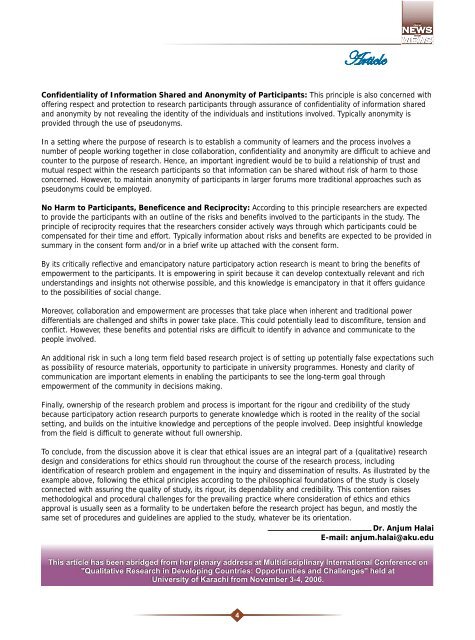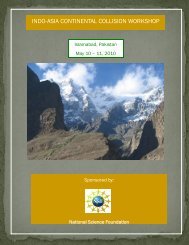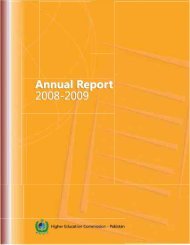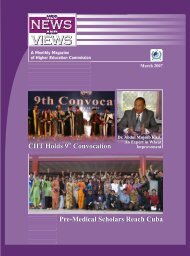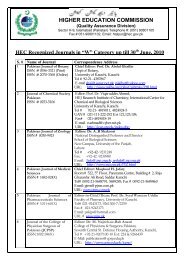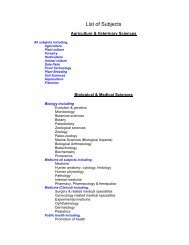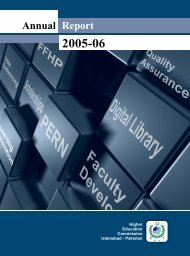Ethics Dilemmas in Qualitative Research - Higher Education ...
Ethics Dilemmas in Qualitative Research - Higher Education ...
Ethics Dilemmas in Qualitative Research - Higher Education ...
Create successful ePaper yourself
Turn your PDF publications into a flip-book with our unique Google optimized e-Paper software.
Confidentiality of Information Shared and Anonymity of Participants: This pr<strong>in</strong>ciple is also concerned with<br />
offer<strong>in</strong>g respect and protection to research participants through assurance of confidentiality of <strong>in</strong>formation shared<br />
and anonymity by not reveal<strong>in</strong>g the identity of the <strong>in</strong>dividuals and <strong>in</strong>stitutions <strong>in</strong>volved. Typically anonymity is<br />
provided through the use of pseudonyms.<br />
In a sett<strong>in</strong>g where the purpose of research is to establish a community of learners and the process <strong>in</strong>volves a<br />
number of people work<strong>in</strong>g together <strong>in</strong> close collaboration, confidentiality and anonymity are difficult to achieve and<br />
counter to the purpose of research. Hence, an important <strong>in</strong>gredient would be to build a relationship of trust and<br />
mutual respect with<strong>in</strong> the research participants so that <strong>in</strong>formation can be shared without risk of harm to those<br />
concerned. However, to ma<strong>in</strong>ta<strong>in</strong> anonymity of participants <strong>in</strong> larger forums more traditional approaches such as<br />
pseudonyms could be employed.<br />
No Harm to Participants, Beneficence and Reciprocity: Accord<strong>in</strong>g to this pr<strong>in</strong>ciple researchers are expected<br />
to provide the participants with an outl<strong>in</strong>e of the risks and benefits <strong>in</strong>volved to the participants <strong>in</strong> the study. The<br />
pr<strong>in</strong>ciple of reciprocity requires that the researchers consider actively ways through which participants could be<br />
compensated for their time and effort. Typically <strong>in</strong>formation about risks and benefits are expected to be provided <strong>in</strong><br />
summary <strong>in</strong> the consent form and/or <strong>in</strong> a brief write up attached with the consent form.<br />
By its critically reflective and emancipatory nature participatory action research is meant to br<strong>in</strong>g the benefits of<br />
empowerment to the participants. It is empower<strong>in</strong>g <strong>in</strong> spirit because it can develop contextually relevant and rich<br />
understand<strong>in</strong>gs and <strong>in</strong>sights not otherwise possible, and this knowledge is emancipatory <strong>in</strong> that it offers guidance<br />
to the possibilities of social change.<br />
Moreover, collaboration and empowerment are processes that take place when <strong>in</strong>herent and traditional power<br />
differentials are challenged and shifts <strong>in</strong> power take place. This could potentially lead to discomfiture, tension and<br />
conflict. However, these benefits and potential risks are difficult to identify <strong>in</strong> advance and communicate to the<br />
people <strong>in</strong>volved.<br />
An additional risk <strong>in</strong> such a long term field based research project is of sett<strong>in</strong>g up potentially false expectations such<br />
as possibility of resource materials, opportunity to participate <strong>in</strong> university programmes. Honesty and clarity of<br />
communication are important elements <strong>in</strong> enabl<strong>in</strong>g the participants to see the long-term goal through<br />
empowerment of the community <strong>in</strong> decisions mak<strong>in</strong>g.<br />
F<strong>in</strong>ally, ownership of the research problem and process is important for the rigour and credibility of the study<br />
because participatory action research purports to generate knowledge which is rooted <strong>in</strong> the reality of the social<br />
sett<strong>in</strong>g, and builds on the <strong>in</strong>tuitive knowledge and perceptions of the people <strong>in</strong>volved. Deep <strong>in</strong>sightful knowledge<br />
from the field is difficult to generate without full ownership.<br />
To conclude, from the discussion above it is clear that ethical issues are an <strong>in</strong>tegral part of a (qualitative) research<br />
design and considerations for ethics should run throughout the course of the research process, <strong>in</strong>clud<strong>in</strong>g<br />
identification of research problem and engagement <strong>in</strong> the <strong>in</strong>quiry and dissem<strong>in</strong>ation of results. As illustrated by the<br />
example above, follow<strong>in</strong>g the ethical pr<strong>in</strong>ciples accord<strong>in</strong>g to the philosophical foundations of the study is closely<br />
connected with assur<strong>in</strong>g the quality of study, its rigour, its dependability and credibility. This contention raises<br />
methodological and procedural challenges for the prevail<strong>in</strong>g practice where consideration of ethics and ethics<br />
approval is usually seen as a formality to be undertaken before the research project has begun, and mostly the<br />
same set of procedures and guidel<strong>in</strong>es are applied to the study, whatever be its orientation.<br />
Dr. Anjum Halai<br />
E-mail: anjum.halai@aku.edu<br />
This article has been abridged from her plenary address at Multidiscipl<strong>in</strong>ary International Conference on<br />
"<strong>Qualitative</strong> <strong>Research</strong> <strong>in</strong> Develop<strong>in</strong>g Countries: Opportunities and Challenges" held at<br />
University of Karachi from November 3-4, 2006.<br />
4


